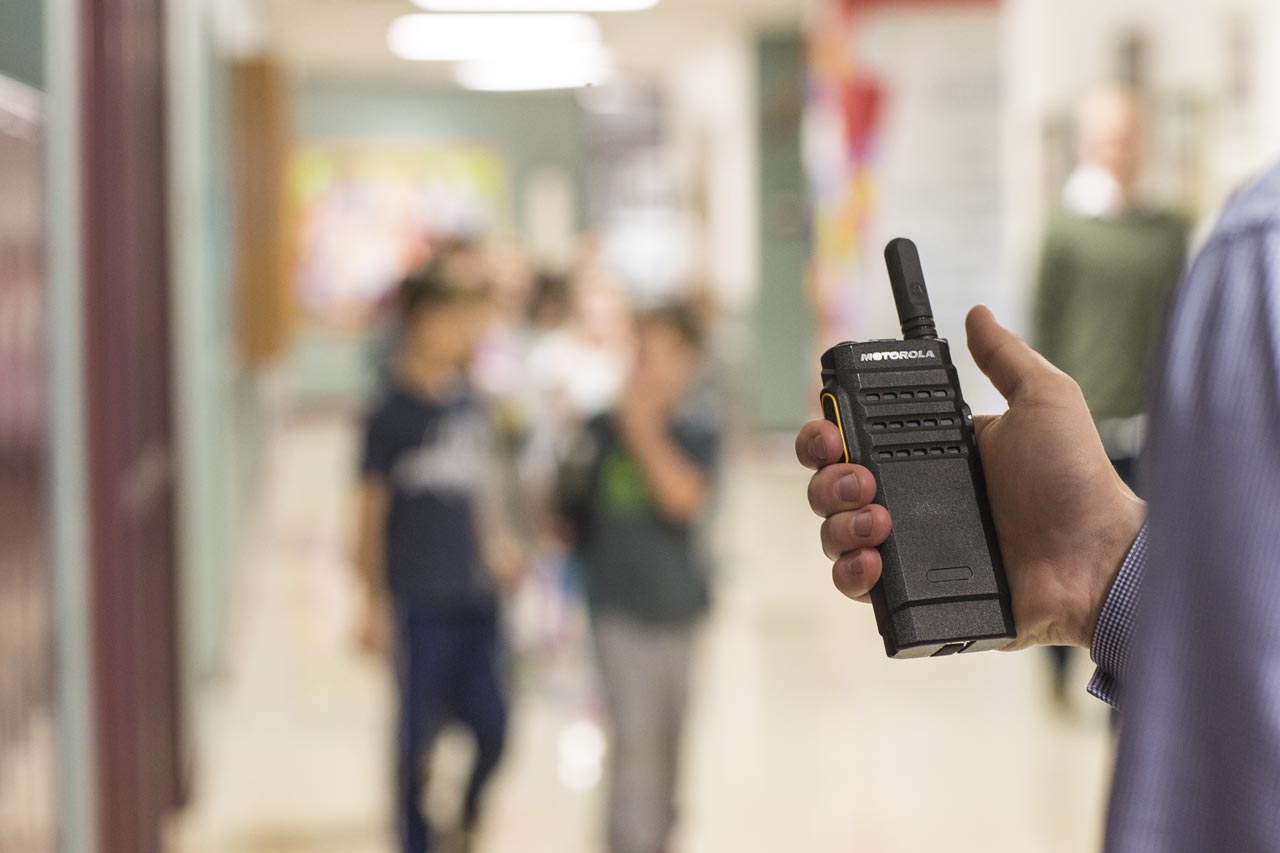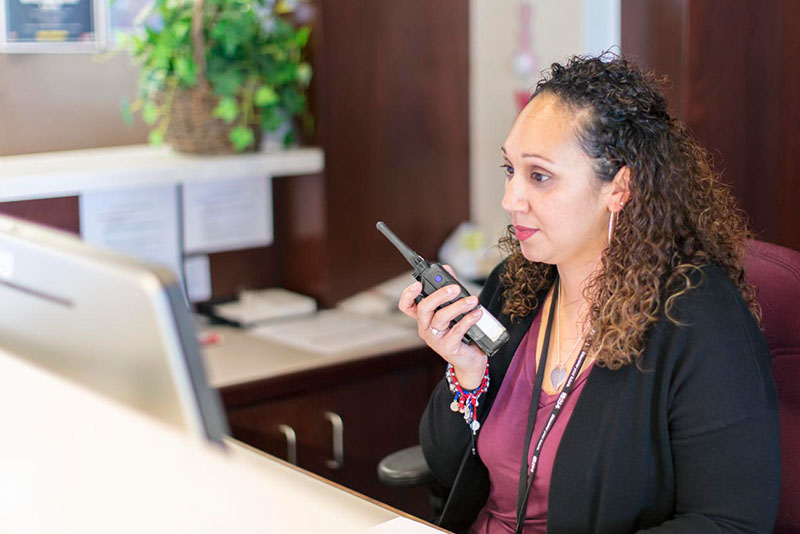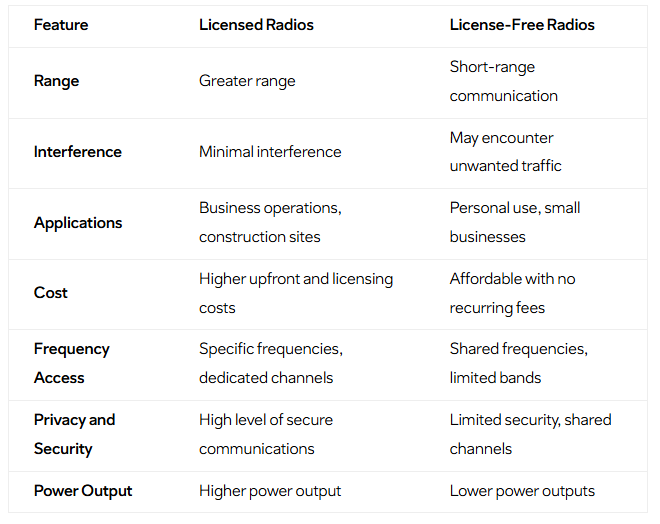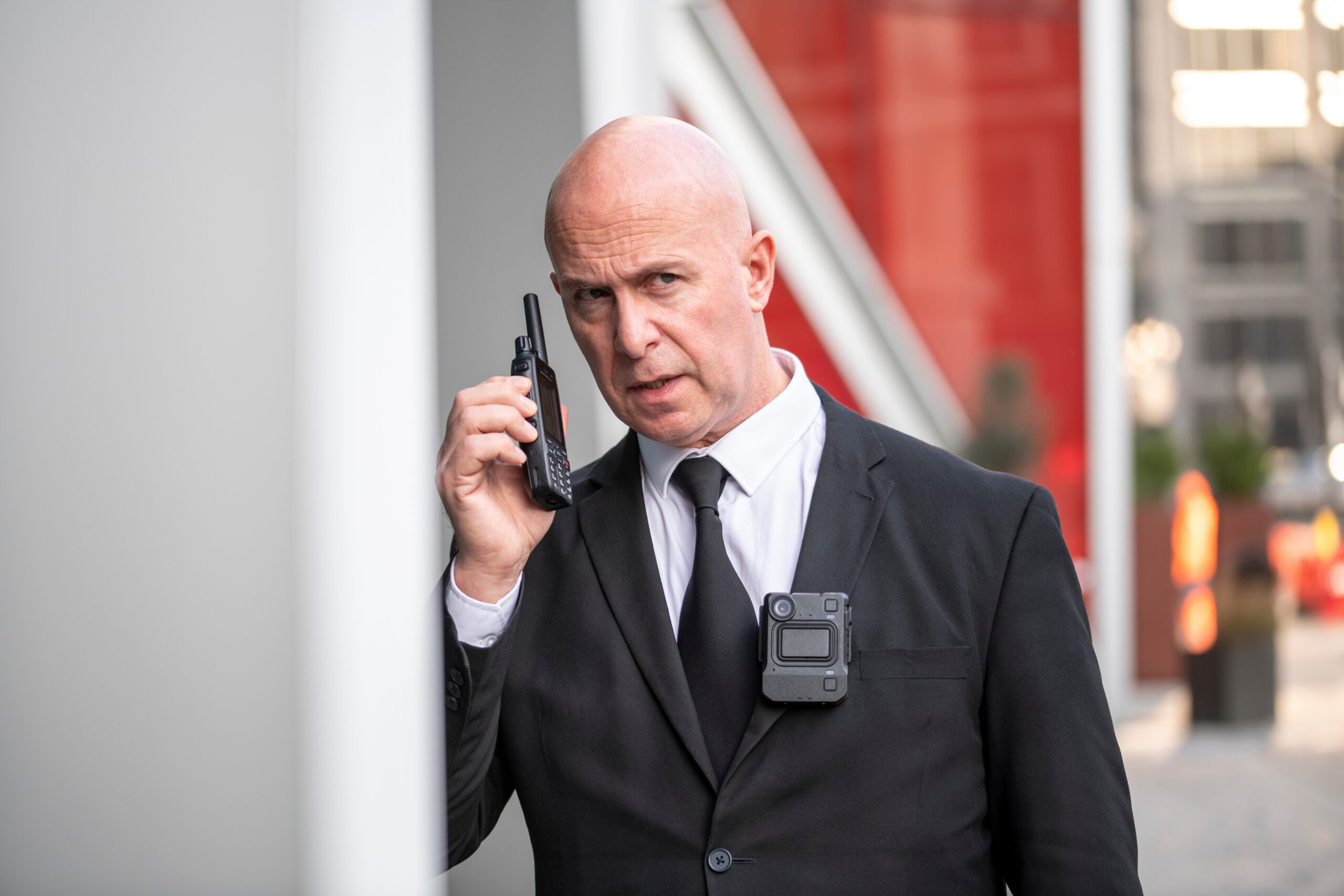Understanding Licensed vs License-Free Two-Way Radios


What Are Two-Way Radios?
Two-way radios are portable communication devices that allow users to transmit and receive messages over radio frequencies. Unlike mobile phones, they operate independently of cellular networks, making them highly reliable in remote areas or during emergencies. These radios can operate on specific frequencies and are categorised into licensed and license-free options.
Whether used in construction, emergency services, or recreational activities, selecting the right device ensures reliable and clear communication. Here we discuss how to choose the right two-way radio for your needs.

License-free vs Licensed Two-Way Radios
Licensed radios require a radio licence to operate. These radios offer greater range, minimal interference, and secure communication, making them ideal for professional and industrial applications. On the other hand, license-free radios are cost-effective and user-friendly, catering to small businesses, families, and recreational users.

How Do Licensed Radios Operate?
Licensed radios function on specific frequency bands regulated by Ofcom in the United Kingdom and ComReg in Ireland. These authorities manage the radio spectrum to ensure reliable and interference-free communication across a variety of applications. By allocating dedicated frequencies, they minimise disruption from other users, ensuring clear and consistent transmissions.
A significant benefit of licensed radios is their capability to operate at higher power outputs, extending their range substantially compared to license-free options. This makes them particularly suited for industries that demand robust communication over large areas, such as public safety, construction, and logistics. The use of dedicated channels also enhances security, ensuring private communication free from external interference.
For event management, licensed radios provide dependable coverage, even in crowded or challenging environments. Emergency services also rely heavily on these systems for secure and uninterrupted communication, often critical in life-saving situations. Overall, the regulatory frameworks established by Ofcom and ComReg are key to maintaining the functionality and reliability of licensed radios, making them essential tools for professional operations.
Applications of Licensed and License-Free Radios
Licensed Radios:
- Construction Sites: Ensure reliable and clear communication across expansive job sites, improving workflow and safety in challenging environments.
- Event Management: Enable seamless coordination and real-time communication among event staff, vendors, and security teams, ensuring smooth operations.
- Emergency Services: Provide secure, high-priority communication channels, crucial for police, fire, and medical personnel during emergencies, ensuring fast and reliable information flow.
- Business Operations: Perfect for large-scale industries or organisations where long-range communication is needed and interference-free channels are critical for day-to-day operations.
- Transportation and Logistics: Used by transportation fleets for secure, real-time communication between drivers, dispatchers, and warehouses, optimising route planning and delivery efficiency.
- Utility Companies: Essential for communication across wide geographical areas, particularly for field workers who need uninterrupted contact with supervisors or emergency response teams.
License-Free Radios:
- Recreational Use: Ideal for family outings, camping trips, hiking, and other outdoor activities, allowing easy communication over short distances without needing a license.
- Small Businesses: An affordable, efficient communication solution for small retail stores, cafés, or offices, enabling fast coordination between team members without the need for an expensive communication setup.
- Personal Use: Simple, user-friendly devices that allow family members or friends to stay in contact over short distances, whether for neighborhood communication or casual day trips.
- Retail and Hospitality: Used by staff in retail stores, hotels, or restaurants for quick communication, improving customer service and operational efficiency without the need for costly infrastructure.
- Security Teams: Cost-effective communication tools for small security companies, allowing security personnel to stay in touch with supervisors and each other during patrols or while monitoring premises.


Stay Connected Anytime, Anywhere
Want to know more about licensed vs. license-free two-way radios? Learn the key differences to make an informed choice. Enhance your communication with the right solution tailored to your needs.
5 important factors to consider when choosing licensed vs license-free two-way radios

Frequency Bands
- Licensed radios use specific frequency bands for reliable communication.
- License-free radios operate on shared frequencies, which do not require a license but may lead to interference.

Durability

Battery Life

Application

Power Output
-
- Higher power output offers extended range but requires a licence.
- Lower power outputs are common in license-free radios for short-range communication.
Regulatory Aspects
Licensed radios require a radio licence or adherence to specific licence types to operate legally. This involves navigating regulatory hurdles, such as the licensing process overseen by Ofcom or Comreg. License-free radios bypass these requirements, making them suitable for personal use and small-scale operations.
When purchasing two-way radios, whether license-free or licensed, several factors need to be considered to ensure the right choice for your needs.
Coverage is one of the most critical aspects. License-free radios typically have a limited range, often restricted to urban environments or smaller operational areas. If your communication needs extend over larger distances, licensed radios are a better option, as they can utilise higher power levels and offer more reliable coverage over vast areas.
Advanced features are another important consideration. Licensed radios often come with additional functionalities such as GPS tracking, Bluetooth connectivity, or the ability to integrate with other systems. These features can enhance user experience, especially in complex or large-scale operations. License-free radios, while more basic, are ideal for smaller teams or environments where advanced features aren’t essential.
Licensing itself is a deciding factor. License-free radios are easier to use as they do not require a permit, making them an attractive option for smaller organisations or personal use. However, licensed radios, although requiring an official license, offer better channel access, less interference, and greater security, which can be vital for businesses in industries like security or construction.
Finally, consider battery life and durability, particularly in environments where radios will be exposed to challenging conditions. Ensuring that your radios are robust and can withstand harsh weather or accidents is essential for long-term reliability.


FAQ
What is the difference between licensed and license-free two-way radios?
Licensed radios provide greater range, security, and minimal interference, while license-free radios are affordable, and user-friendly, suitable for personal and small business use or use within a shorter range area that is free from obstructions.
How does licensing affect communication reliability and range?
Licensing allows access to specific frequencies and higher power output, ensuring reliable and clear communication over longer distances.
What are the primary applications for licensed vs license-free radios?
Licensed radios are ideal for industries like construction, event management, and emergency services, while license-free radios cater to recreational users and small businesses.
How can businesses decide which type of two-way radio suits their needs?
Businesses should assess their communication needs, considering factors like range, interference, budget, and specific industry requirements.

